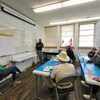Rare illness sickens local children
Three cases of Environmental Infant Botulism, a condition that results when a baby ingests specific spores that produce botulinum toxin in the large intestine, have recently been reported in East Texas. Two of which have developed in Troup.
“For reasons we do not understand, some infants get botulism when the spores get into their digestive tracts, grow, and produce the toxin,” reads a statement on the Centers for Disease Control and Prevention (CDC) website, www.cdc.gov. Symptoms of botulism, which may be observed in infants, include lethargy, poor feeding, constipation, a weak cry or poor muscle tone, also known as floppy baby. All these result from muscle paralysis caused by the toxin.
Most infant botulism cases cannot be prevented because the bacteria that causes the disease is in soil and dust and can be found inside homes even after cleaning, according to the CDC site. The only known preventative measure is to not feed honey to children 12 months or younger due to it also being a source of botulinum spores.
The condition is rare with only 141 cases reported in the U.S. in 2017, the last year for which data was available. Of those, only nine cases occurred in Texas.
The rarity of the illness isn’t likely to soothe those whose family members have contracted it. With the few cases each year in Texas, a correct diagnosis may not immediately be determined as in the case of Sheila Santiago’s grandson, Andrew.
Santiago reported Andrew had always had issues with gas and occasional constipation, so when he became constipated again it was not a serious concern. She consulted with a doctor who suggested prune juice be added to his formula. It wasn’t until he wouldn’t eat for two or three feedings in a row that she became more concerned and took Andrew to an emergency room in Jacksonville. Numerous test results failed to diagnose the problem and the baby continued to deteriorate. Doctors were initially going to send him home, but he was ultimately transferred to Children’s Medical in Dallas.
At Children’s, Andrew became unable to swallow. It was determined he needed to be moved to the Intensive Care Unit (ICU). Though it would take three weeks for tests to confirm the infant had botulism, the doctors requested to treat him for the illness stating if he didn’t have the illness, the medication would not harm him.
Currently the treatment for infant botulism is a drug called BabyBIG, available only through the California Department of Public Health. While the anti-toxin BabyBIG does not reverse paralysis caused by botulism, it does halt the progression, according to the CDC.
While recovery may take weeks to months, infant botulism patients can expect full and complete recovery, according to the California Department of Health Services.
Santiago reports her grandson has been given a prognosis of 100 percent recovery though he currently has a night nurse and requires a variety of therapies.
Although it was difficult for her to relive all Anthony had suffered, Santiago still posted his story online.
“It was hard for me to relive, but the reason I did it was because I want to educate people and to know that it is okay to advocate for your kids. I understand the tests were all negative, but if your kid still is not acting right, it’s okay to stand up and advocate for them. It’s okay if you have to take them to another facility. If you have to get another opinion, it’s okay to do that because you are the one who knows your kid the best.”
Please support The Cherokeean Herald by subscribing today!
